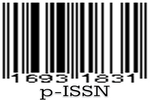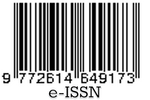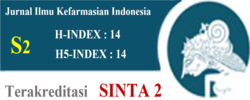Hypoglycemia Incidence Rate in National and Non-National Health Insurance of Type 2 Diabetes Patients in COVID-19 Pandemic at Central Borneo
Abstract
Community activity restrictions during the COVID-19 pandemic in Indonesia impact the quantity and quality of health services for type 2 diabetes (T2DM). This limitation could increase the risk of hypoglycemia in type 2 diabetes patients. The study aimed to compare the incidence rate of hypoglycemia between national (NHIP) and non-national health insurance participants (N-NHIP) with T2DM during the COVID-19 pandemic in Indonesia. The study used a cross-sectional design and was conducted at a government hospital in Central Borneo. Data was collected by consecutive sampling from September to November 2021. Sixty-two participants were divided into two groups (NHIP and N-NHIP groups). Each group consisted of 31 participants. They were interviewed regarding their experience with hypoglycemia in the last three months. The incidence rate of hypoglycemia in N-NHIP was higher than in NHIP (93.55% vs. 87.10%; p>0.05). Hypoglycemia is mostly presented in patients using a combination of short-acting and long-acting insulin. The incidence rate of hypoglycemia in T2DM during the COVID-19 pandemic in Central Borneo was relatively high. In future studies, it is necessary to analyse the factors that significantly affect the incidence of hypoglycemia in the population of T2DM patients in Indonesia.
References
2. Greenway FL. Severe hypoglycemia in the look AHEAD trial. J Diabetes Complications. 2016;30(5):935–43.
3. Davies MJ, D’Alessio DA, Fradkin J, Kernan WN, Mathieu C, Mingrone G, et al. Management of hyperglycemia in type 2 diabetes, 2018. A consensus report by the American diabetes association (ADA) and the European association for the study of diabetes (EASD). Diabetes Care. 2018;41(12):2669–701.
4. Association AD. 6. Glycemic targets: standards of medical care in diabetes—2021. Diabetes Care. 2021;44(Supplement 1):S73–84.
5. Iloh GP, Amadi A. Epidemiology of hypoglycemia among ambulatory type 2 diabetic patients in a primary care clinic of a tertiary hospital in Southeastern Nigeria. Journal of Health Research and Reviews. 2021;5(2):57- 65.
6. Lamounier RN, Geloneze B, Leite SO, Montenegro R, Zajdenverg L, Fernandes M, et al. Hypoglycemia incidence and awareness among insulin-treated patients with diabetes: the HAT study in Brazil. Diabetol Metab Syndr. 2018;10(1):1-10.
7. Rudijanto A, Saraswati MR, Yunir E, Kumala P, Puteri HHS, Mandang VV V. Indonesia cohort of IO HAT study to evaluate diabetes management, control, and complications in retrospective and prospective periods among insulin-treated patients with type 1 and type 2 diabetes. Acta Med Indones. 2018;50(1):26-37.
8. Shriraam V, Mahadevan S, Anitharani M, Jagadeesh N, Kurup S, Vidya T, et al. Reported hypoglycemia in Type 2 diabetes mellitus patients: Prevalence and practices-a hospital-based study. undefined. 2017;21(1):148–53.
9. Besen DB, Surucu HA, Koşar C. Self-reported frequency, severity of, and awareness of hypoglycemia in type 2 (POPs) related to consumption of sea cucumbers. Foods. 2022;11(24):3992.
diabetes patients in Turkey. PeerJ. 2016;2016(12):1-14.
10. Mohseni M, Ahmadi S, Azami-Aghdash S, Mousavi Isfahani H, Moosavi A, Fardid M, et al. Challenges of routine diabetes care during COVID-19 era: A systematic search and narrative review. Prim Care Diabetes. 2021 Dec 1;15(6):918–22.
11. Seidu S, Hambling C, Holmes P, Fernando K, Campbell NS, Davies S, et al. The impact of the COVID pandemic on primary care diabetes services in the UK: A cross-sectional national survey of views of health professionals delivering diabetes care. Prim Care Diabetes. 2022;16(2):257–63.
12. Caballero AE, Ceriello A, Misra A, Aschner P, McDonnell ME, Hassanein M, et al. COVID-19 in people living with diabetes: An international consensus. J Diabetes Complications. 2020;34(9):107671.
13. Au NH, Ratzki-Leewing A, Zou G, Ryan BL, Webster- Bogaert S, Reichert SM, et al. Real-world incidence and risk factors for daytime and nocturnal non-severe hypoglycemia in adults with type 2 diabetes mellitus on insulin and/or secretagogues (InHypo-DM Study, Canada). Can J Diabetes. 2022; 46(2): 196-203.
14. Perkumpulan Endokrinologi Indonesia. Pedoman Pengelolaan dan Pencegahan Diabetes Melitus Tipe 2 Dewasa di Indonesia 2021. Jakarta: Perkeni; 2021.
15. Akirov A, Amitai O, Masri-Iraqi H, Diker-Cohen T, Shochat T, Eizenberg Y, et al. Predictors of hypoglycemia in hospitalized patients with diabetes mellitus. Intern Emerg Med. 2018;13(3):343–50.
16. Malkani S, Kotwal A. Frequency and predictors of self-reported hypoglycemia in insulin-treated diabetes. J Diabetes Res. 2017;2017:1-8
17. Sonoda N, Morimoto A, Ugi S, Morino K, Sekine O, Nemoto K, et al. Predictors for mild and severe hypoglycemia in insulin-treated Japanese diabetic patients. PLoS One. 2015;10(6):e0130584.
18. Nassar DT, Habib OS, Mansour AA. Predictors of hypoglycemia in insulin-treated patients with type 2 diabetes mellitus in Basrah. World J Diabetes. 2016;7(18):470–80.
19. LaManna J, Litchman ML, Dickinson JK, Todd A, Julius MM, Whitehouse CR, et al. Diabetes education impact on hypoglycemia outcomes: a systematic review of evidence and gaps in the literature. Diabetes Educ. 2019;45(4):349–69.
20. Borzì V, Frasson S, Gussoni G, Di Lillo M, Gerloni R, Augello G, et al. Risk factors for hypoglycemia in patients with type 2 diabetes, hospitalized in internal medicine wards: Findings from the FADOI-DIAMOND study. Diabetes Res Clin Pract. 2016;115:24–30.
21. Lee AK, Lee CJ, Huang ES, Sharrett AR, Coresh J, Selvin E. Risk factors for severe hypoglycemia in black and white adults with diabetes: the atherosclerosis risk in communities (ARIC) study. Diabetes Care. 2017;40(12):1661–7.
22. Nuzzo A, Brignoli A, Chantal Ponziani M, Zavattaro M, Prodam F, Castello LM, et al. Aging and comorbidities influence the risk of hospitalization and mortality in diabetic patients experiencing severe hypoglycemia. Nutrition, Metabolism and Cardiovascular Diseases. 2021; 32(1):160-6.
23. Caeiro G, Romero SA, Solis SE, Pozzi JM, Lozano ME, Waitman J. Type 2 diabetes. Prevalence of hypoglycemia in public versus private health care system. Medicina. 2020; 80(3):203-10.
24. Parkin CG, Davidson JA. Value of self-monitoring blood glucose pattern analysis in improving diabetes outcomes. J Diabetes Sci Technol. 2009;3(3):500–8.
25. Jasper US, Opara MC, Pyiki EB, Akinrolie O. Knowledge of insulin use and its determinants among Nigerian insulin requiring diabetes patients. J Diabetes Metab Disord. 2014;13(1):1-8.
26. Karaoui LR, Deeb ME, Nasser L, Hallit S. Knowledge and practice of patients with diabetes mellitus in Lebanon: A cross-sectional study. BMC Public Health. 2018;18(1):1–9.
27. Netere AK, Ashete E, Gebreyohannes EA, Belachew SA. Evaluations of knowledge, skills and practices of insulin storage and injection handling techniques of diabetic patients in Ethiopian primary hospitals. BMC Public Health. 2020;20(1):1–10.
28. Van Meijel LA, De Vegt F, Abbink EJ, Rutters F, Sch¬ram MT, Van Der Klauw MM, et al. High prevalence of impaired awareness of hypoglycemia and severe hypoglycemia among people with insulin-treated type 2 diabetes: The Dutch Diabetes Pearl Cohort. BMJ Open Diabetes Res Care. 2020;8(1):e000935.
29. Nasir BB, Buseir MS, Muhammed OS. Knowledge, attitude and practice towards insulin self-administration and associated factors among diabetic patients at Zewditu Memorial Hospital, Ethiopia. PLoS One. 2021;16(2):e0246741.
30. Alsairafi Z, Waheedi M, Alsaleh F. The perspectives of patients and physicians on the role of pharmacists in improving medication adherence in type 2 diabetes: a qualitative study. Patient Prefer Adherence. 2019:9(13):1527–43.
31. Titlestad I, Haugstvedt A, Igland J, Graue M. Patient safety culture in nursing homes - a cross-sectional study among nurses and nursing aides caring for residents with diabetes. BMC Nurs. 2018;17(1):1–8.
32. Al Haqan AA, Al-Taweel DM, Awad A, Wake DJ. Pharmacists’ Attitudes and role in diabetes management in Kuwait. Med Princ Pract. 2017;26(3):273–9.
33. Vaughan EM, Naik AD, Amspoker AB, Johnston CA, Landrum JD, Balasubramanyam A, et al. Mentored implementation to initiate a diabetes program in an underserved community: a pilot study. BMJ Open
Diabetes Res Care. 2021;9(1): e002320.
34. Szafran O, Kennett SL, Bell NR, Torti JMI. Interprofessional collaboration in diabetes care: Perceptions of family physicians practicing in or not in a primary health care team. BMC Fam Pract. 2019;20(1):1–10.
35. Santoso SA, Setiadi AP, Widjaja KK, Wibowo YI. Drug information for diabetes mellitus outpatients at RSUD X Surabaya : what was provided and what was known?. Jurnal Ilmu Kefarmasian Indonesia. 2023;21(1):27–33.
36. Manninda R, Anggriani Y, Sari AK. The impact of chronic disease management program (Prolanis) to improve the clinical outcome of patients diabetes mellitus type 2: a study in primary health care center in Jakarta, Indonesia. Jurnal Ilmu Kefarmasian Indonesia. 2021;19(2):237–41.
37. Lin J, Li X, Jiang S, Ma X, Yang Y, Zhou Z. Utilizing technology-enabled intervention to improve blood glucose self-management outcome in type 2 diabetic patients initiated on insulin therapy: a retrospective real-world study. Int J Endocrinol. 2020;2020:1-8.

This work is licensed under a Creative Commons Attribution-NonCommercial-ShareAlike 4.0 International License.
Licencing
All articles in Jurnal Ilmu Kefarmasian Indonesia are an open-access article, distributed under the terms of the Creative Commons Attribution-NonCommercial-ShareAlike 4.0 International License which permits unrestricted non-commercial used, distribution and reproduction in any medium.
This licence applies to Author(s) and Public Reader means that the users mays :
- SHARE:
copy and redistribute the article in any medium or format - ADAPT:
remix, transform, and build upon the article (eg.: to produce a new research work and, possibly, a new publication) - ALIKE:
If you remix, transform, or build upon the article, you must distribute your contributions under the same license as the original. - NO ADDITIONAL RESTRICTIONS:
You may not apply legal terms or technological measures that legally restrict others from doing anything the license permits.
It does however mean that when you use it you must:
- ATTRIBUTION: You must give appropriate credit to both the Author(s) and the journal, provide a link to the license, and indicate if changes were made. You may do so in any reasonable manner, but not in any way that suggests the licensor endorses you or your use.
You may not:
- NONCOMMERCIAL: You may not use the article for commercial purposes.
This work is licensed under a Creative Commons Attribution-NonCommercial-ShareAlike 4.0 International License.





 Tools
Tools





















